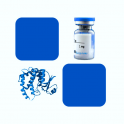
- Remove this product from my favorite's list.
- Add this product to my list of favorites.
Products
Viewed products
Newsletter
 |  |  |  |  |  |

Background
Tyrosine-protein phosphatase non-receptor type substrate 1 (SHPS1) also known as CD172 antigen-like family member A (CD172a), Macrophage fusion receptor, MyD-1 antigen, Signal-regulatory protein alpha (SIRPA or SIRP alpha) or p84, is a member of the SIRP family, and also belongs to the immunoglobulin superfamily. SIRP alpha is Ubiquitous and highly expressed in brain. SIRPA / CD172a is immunoglobulin-like cell surface receptor for CD47 and acts as docking protein and induces translocation of PTPN6, PTPN11 and other binding partners from the cytosol to the plasma membrane. SIRPA / SHPS-1 supports adhesion of cerebellar neurons, neurite outgrowth and glial cell attachment and may play a key role in intracellular signaling during synaptogenesis and in synaptic function By similarity. SIRPA / MyD1 involved in the negative regulation of receptor tyrosine kinase-coupled cellular responses induced by cell adhesion, growth factors or insulin and mediates negative regulation of phagocytosis, mast cell activation and dendritic cell activation. CD47 binding prevents maturation of immature dendritic cells and inhibits cytokine production by mature dendritic cells.
Source
Recombinant Biotinylated Human SIRP alpha, His,Avitag (SIA-H82E0) is expressed from human 293 cells (HEK293). It contains AA Glu 31 - Arg 370 (Accession # NP_001035111).
Predicted N-terminus: Glu 31
Molecular Characterization
This protein carries a polyhistidine tag at the C-terminus, followed by an Avi tag (Avitag™).
The protein has a calculated MW of 39.9 kDa. The protein migrates as 50-65 kDa under reducing (R) condition (SDS-PAGE) due to glycosylation.
Biotinylation
Biotinylation of this product is performed using Avitag™ technology. Briefly, the single lysine residue in the Avitag is enzymatically labeled with biotin.
Biotin:Protein Ratio
Passed as determined by the HABA assay / binding ELISA.
Endotoxin
Less than 1.0 EU per μg by the LAL method.
Purity
>95% as determined by SDS-PAGE.
>90% as determined by SEC-MALS.
Formulation
Lyophilized from 0.22 μm filtered solution in PBS, pH7.4 with trehalose as protectant.
Reconstitution
Please see Certificate of Analysis for specific instructions.
For best performance, we strongly recommend you to follow the reconstitution protocol provided in the CoA.
Storage
For long term storage, the product should be stored at lyophilized state at -20°C or lower.
Please avoid repeated freeze-thaw cycles.
This product is stable after storage at:
-20°C to -70°C for 12 months in lyophilized state;
-70°C for 3 months under sterile conditions after reconstitution.
Bioactivity
Please refer to product data sheet.
(1) "SIRP-alpha-IL-6 axis induces immunosuppressive macrophages in non-small-cell lung cancer
Wang, Pan, Chen et al
Biochem Biophys Res Commun (2023) 682, 386-396
(2) "A novel CD47-blocking peptide fused to pro-apoptotic KLA repeat inhibits lung cancer growth in mice
Pan, Hu, Chen et al
Cancer Immunol Immunother (2023)
(3) "[Radix Tetrastigme Polysaccharide Promotes Antitumor Immune Response
in Lewis Lung Cancer Mice]
Zhao, Zhu, Lu
Zhongguo Fei Ai Za Zhi (2023) 26 (8), 559-571
Showing 1-3 of 154 papers.
Recombinant human SIRP alpha / CD172a Protein, (HPLC-verified), Fc Tag, 100µg - 383,50 €
Recombinant Human SIRP alpha / CD172a Protein, His tag (MALS verified), 100µg - 396,50 €
Recombinant Human SIRP alpha / CD172a Protein, Mouse Fc Tag (HPLC-verified), 100µg - 377,00 €
Recombinant Biotinylated Cynomolgus SIRP alpha / CD172a Protein, His,Avitag™ (MALS verified), 25 µg - 468,00 €
Recombinant Biotinylated Mouse SIRP alpha / CD172a Protein, His,Avitag™ (MALS verified), 25 µg - 468,00 €
Recombinant Mouse SIRP alpha / CD172a Protein, His Tag, 100 µg - 442,00 €
Follow us